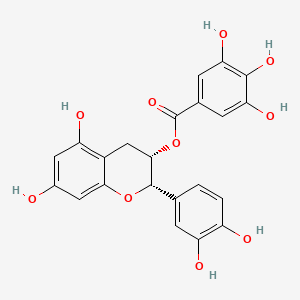| MeSH term | MeSH ID | Detail |
|---|---|---|
| Colonic Neoplasms | D003110 | 161 associated lipids |
| Cicatrix | D002921 | 9 associated lipids |
Epicatechin-3-gallate
Epicatechin-3-gallate is a lipid of Polyketides (PK) class. Epicatechin-3-gallate is associated with abnormalities such as Epilepsy and Megalencephaly. The involved functions are known as Docking, Drug Interactions, inhibitors, Oxidation and Inflammation Process. Epicatechin-3-gallate often locates in Solitary microtubule component of centriole or axonemal complex, Palmar surface, Glial and peritoneal. The associated genes with Epicatechin-3-gallate are Homologous Gene and TSC1 gene.
Cross Reference
Introduction
To understand associated biological information of Epicatechin-3-gallate, we collected biological information of abnormalities, associated pathways, cellular/molecular locations, biological functions, related genes/proteins, lipids and common seen animal/experimental models with organized paragraphs from literatures.
What diseases are associated with Epicatechin-3-gallate?
Epicatechin-3-gallate is suspected in Epilepsy, Megalencephaly and other diseases in descending order of the highest number of associated sentences.
Related references are mostly published in these journals:
| Disease | Cross reference | Weighted score | Related literature |
|---|
Possible diseases from mapped MeSH terms on references
We collected disease MeSH terms mapped to the references associated with Epicatechin-3-gallate
PubChem Associated disorders and diseases
What pathways are associated with Epicatechin-3-gallate
There are no associated biomedical information in the current reference collection.
PubChem Biomolecular Interactions and Pathways
Link to PubChem Biomolecular Interactions and PathwaysWhat cellular locations are associated with Epicatechin-3-gallate?
Visualization in cellular structure
Associated locations are in red color. Not associated locations are in black.
Related references are published most in these journals:
| Location | Cross reference | Weighted score | Related literatures |
|---|
What functions are associated with Epicatechin-3-gallate?
Related references are published most in these journals:
| Function | Cross reference | Weighted score | Related literatures |
|---|
What lipids are associated with Epicatechin-3-gallate?
There are no associated biomedical information in the current reference collection.
What genes are associated with Epicatechin-3-gallate?
Related references are published most in these journals:
| Gene | Cross reference | Weighted score | Related literatures |
|---|
What common seen animal models are associated with Epicatechin-3-gallate?
There are no associated biomedical information in the current reference collection.
NCBI Entrez Crosslinks
All references with Epicatechin-3-gallate
Download all related citations| Authors | Title | Published | Journal | PubMed Link |
|---|---|---|---|---|
| Anger DL et al. | Heteroactivation of cytochrome P450 1A1 by teas and tea polyphenols. | 2005 | Br. J. Pharmacol. | pmid:15895106 |
| Iwasaki M et al. | Plasma tea polyphenol levels and subsequent risk of breast cancer among Japanese women: a nested case-control study. | 2010 | Breast Cancer Res. Treat. | pmid:20440552 |
| Ando T et al. | Effects of tea catechins on cholesterol absorption with exogenously hypercholesterolemic rat (ExHC-Ta). | 1989 | Bull Kanagawa Dent Coll | pmid:2519221 |
| Paschka AG et al. | Induction of apoptosis in prostate cancer cell lines by the green tea component, (-)-epigallocatechin-3-gallate. | 1998 | Cancer Lett. | pmid:9751250 |
| Tan X et al. | Differences of four catechins in cell cycle arrest and induction of apoptosis in LoVo cells. | 2000 | Cancer Lett. | pmid:10940502 |
| Lamy S et al. | Green tea catechins inhibit vascular endothelial growth factor receptor phosphorylation. | 2002 | Cancer Res. | pmid:11809684 |
| Kürbitz C et al. | Epicatechin gallate and catechin gallate are superior to epigallocatechin gallate in growth suppression and anti-inflammatory activities in pancreatic tumor cells. | 2011 | Cancer Sci. | pmid:21241417 |
| Choudhary S et al. | Intervention of human breast cell carcinogenesis chronically induced by 2-amino-1-methyl-6-phenylimidazo[4,5-b]pyridine. | 2012 | Carcinogenesis | pmid:22307971 |
| Baek SJ et al. | Epicatechin gallate-induced expression of NAG-1 is associated with growth inhibition and apoptosis in colon cancer cells. | 2004 | Carcinogenesis | pmid:15308587 |
| Rathore K et al. | Green tea catechin intervention of reactive oxygen species-mediated ERK pathway activation and chronically induced breast cell carcinogenesis. | 2012 | Carcinogenesis | pmid:22045026 |
